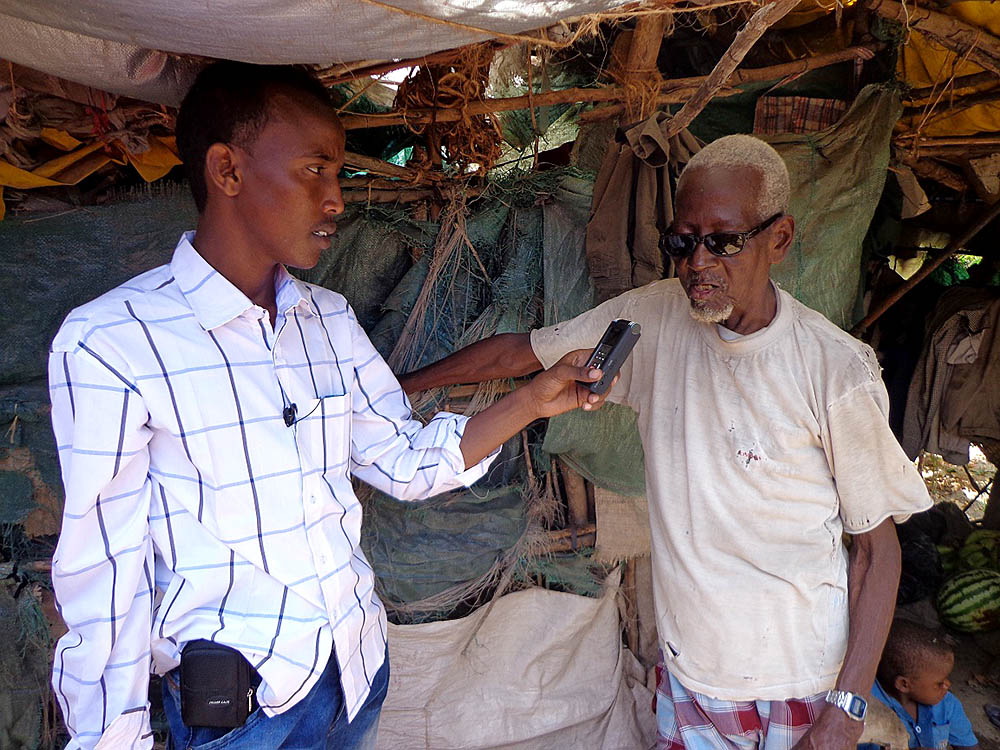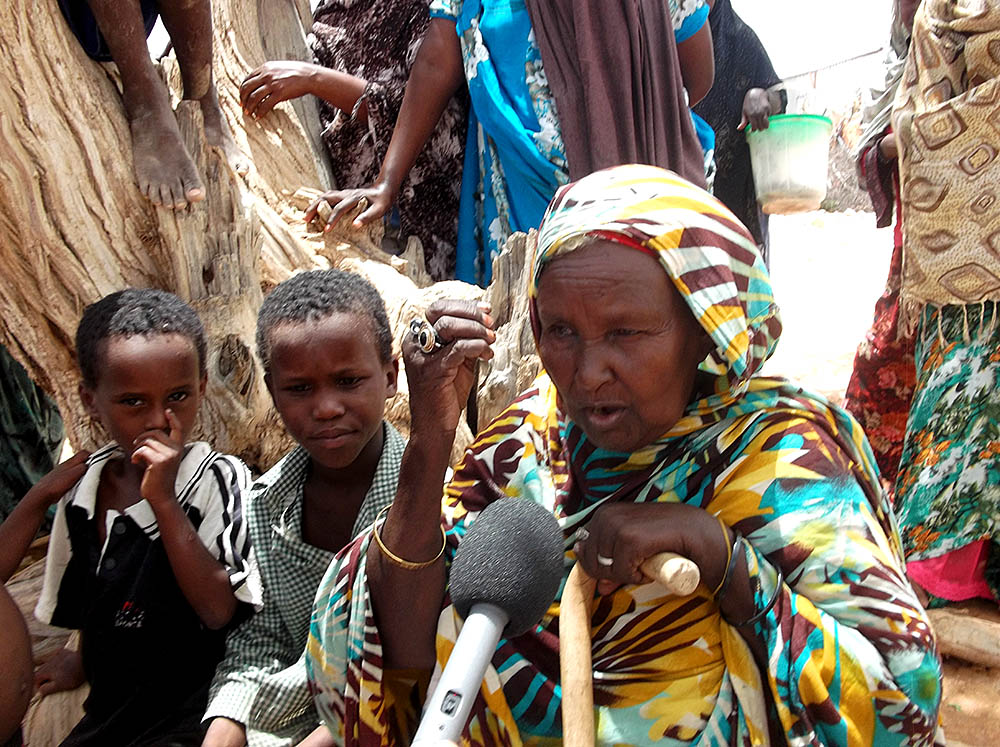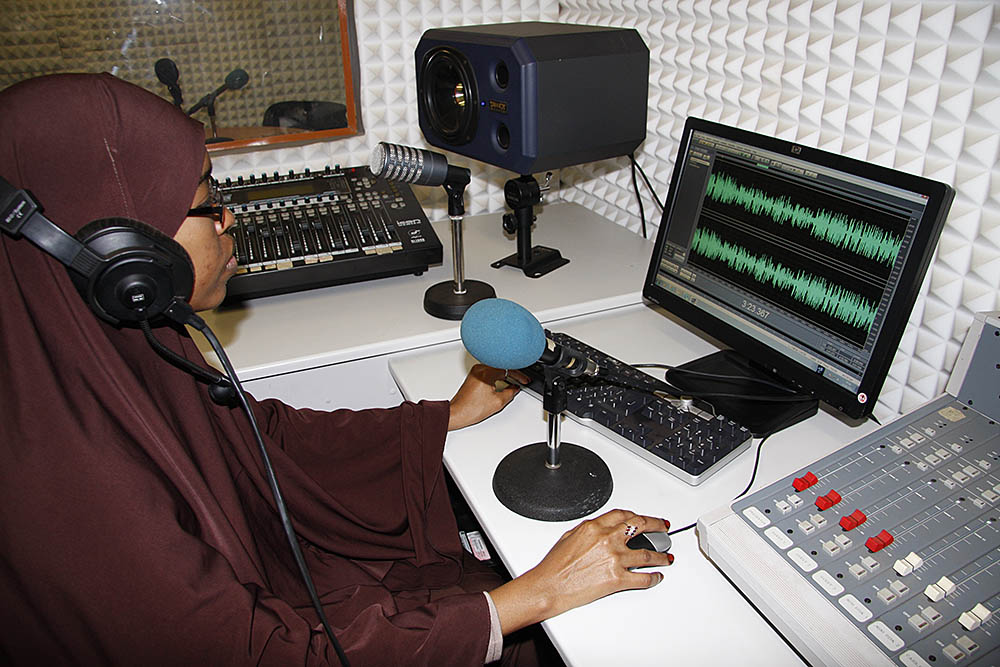
Amplifying the voices of Somalia
By Andreas Reventlow, IMS Communications Coordinator
“I have stories and poems to give to you, please contact me,” says a caller from Galgaduud in central Somalia in his voice message to Radio Ergo, an IMS-supported radio service providing people across Somalia with vital humanitarian news and information
They say there’s really no such thing as the ‘voiceless’. There are only the deliberately silenced, or the preferably unheard. In Somalia, a country heavily characterised by its oral culture this is particularly true.
Last month, Radio Ergo introduced Freedom Fone, which enables listeners to call in and communicate directly with the radio and feed into programmes, in essence amplifying previously unheard voices.
The combination of increased mobile phone usage across Somalia, and the ability of Radio Ergo’s short wave radio broadcasts to reach even the most remote rural areas where many Somalis live, makes Freedom Fone an apt choice, says Louise Tunbridge, Project Coordinator at Radio Ergo.
“Freedom Fone enables us to engage much more directly with our listeners in local communities, and the response has been quite dramatic so far with up 60-80 daily messages.”
The majority of callers ask questions on health-related issues to Radio Ergo’s health show Radio Doctor.
Formerly a United Nations radio service, Radio Ergo has been broadcasting with the support of IMS since 2011, and has over the years become a platform for amplifying stories of success, hope, and achievement throughout Somalia.
Through its unique presence across the country with a network of local stringers, the radio has become an indispensable source of vital humanitarian information for both the Somali population as well as international relief agencies.

conflict. Photo Radio Ergo stringer
Inspiring communities
Although its studio is based in Nairobi, Radio Ergo transmits via short wave from the United Arab Emirates. With a daily rebroadcast on 18 FM stations inside Somalia, Ergo’s broadcasts reach every part of the country and beyond.
Working with experts from UN agencies and other international organisations provides for high-quality programming on everything from disaster mitigation and disease prevention, to livestock prices that empower farmers and pastoralists.
“Our programmes aim to improve the resilience of Somalis who are at risk of the country’s ongoing humanitarian crisis,” says Louise Tunbridge. But direct input from listeners has prompted Ergo’s production staff in Nairobi to cater to new programming needs as well. This means a shift in focus from predominantly humanitarian areas, to the emerging needs of a population experiencing the slow but steady progress Somalia is undergoing, she says.
“We’re moving towards programming aimed at inspiring and encouraging communities to protect themselves and improve their situations.”
By introducing Freedom Fone, Radio Ergo is able to engage directly with its listeners and survey them on how they are taking measures to mitigate disasters:
“We ask listeners how they themselves are working to protect their homes and their livelihoods. This makes it possible to start a more lively discussion on how their circumstances could be improved and authorities could support them.
“We do this to strengthen our programming to help people prepare and reduce the risks of disasters and health threats. Our Radio Doctor show, which provides information on preventive health measures as well as treatment for common diseases, has been expanded to run twice a week due to a high demand from listeners.”

Bridging the communication gap
In a bid to extend its reach beyond shortwave and rebroadcasting on FM, Radio Ergo’s website was relaunched earlier this year and now offers the daily programme for streaming and download, as well as articles and photo stories.
This at a time when some parts of Somalia are seeing a spike in mobile phone users and improved access to the internet. It also gives the enormous Somali diaspora of over one million people a chance to tune into Ergo’s local updates.
The website is also available in English, catering to among others the large number of international humanitarian workers in the country. This is a key part of Ergo’s role as it continues to bridge the communication gap between Somalis and humanitarian agencies.
Ergo’s programming goes both ways in that it gives humanitarian organisations an opportunity to broadcast key humanitarian messages to the Somali population, while also “providing a platform for engagement with beneficiaries through direct feedback,” says Rita Maingi, Public Information Officer at OCHA Somalia. The same applies to the Danish Refugee Council, says Alexandra Strand Holm, Regional Communications Officer:
“Radio Ergo’s news headlines serve to inform and inspire our staff and programmes, and the daily broadcasts is a significant platform for us in order to profile and position humanitarian aid interventions, specific concerns and general developments regarding Somalia.”
Improving journalistic skills
With formal journalistic education difficult to come by for most Somalis, locals often start working as journalists without much professional training. Over the past year, Radio Ergo has taken the first steps to improving journalistic skills, offering a total of 76 Somali journalists a series of courses on investigative journalism, basic reporting, ethics, and humanitarian issues.
“So many things have changed in my reporting style and in how I investigate issues,”says Halima Saidi who participated in an investigative journalism course conducted by Ergo in Garowe, the capital of the Puntland region. After the training she produced an investigative radio feature on a recent military battle in Kismayo, the commercial capital of the Jubaland region. The city was under the control of al-Shabaab for years until it was re-captured by the Somali Army and other groups in September 2012.
“I investigated the challenges and obstacles hindering security and why Kismayo has been the epicentre of conflict and disagreements among so many competing groups. My editor’s feedback was so exciting and he encouraged me to conduct more investigations,” says Halima Saidi.

Risks for journalists remain
Despite such positive progress and an overall decrease in violent incidents, Somali journalists continue to face high risks for doing their job
In February, Radio Ergo’s Mogadishu stringer, Abdiaziz Abdinur Ibrahim was arrested and put on trial after he had interviewed a rape victim. He was accused of “offending state institutions”. Following much international attention and pressure, Abdiaziz and the rape victim were released from prison in March. Abdiaziz went into exile after his release, saying to Radio Ergo that he felt unsafe returning to Mogadishu.
A little over a month later, Radio Ergo’s stringer in the south-central city of Beletweyne, Abdullahi Salat was attacked and badly injured by an unknown assailant wielding an axe. The attacker is currently in AMISOM custody.
Independent journalism is also being targeted through legal means by authorities. In March, the Puntland Ministry of Information banned local radios from rebroadcasting programming from Radio Ergo and two other radios. The ban was met with intense criticism from “Network 2013”, a network of local radios supported by IMS, which said the Ministry was attempting to interfere with their editorial independence.
IMS supports Radio Ergo through its daughter company IMS Productions ApS with a branch office in Kenya. It provides one-hour daily radio programmes of original humanitarian news, educational and informational programmes, investigative stories, features, public service announcements, debates and radio dramas.
Visit Radio Ergo at www.radioergo.org or join them on Facebook or Twitter




